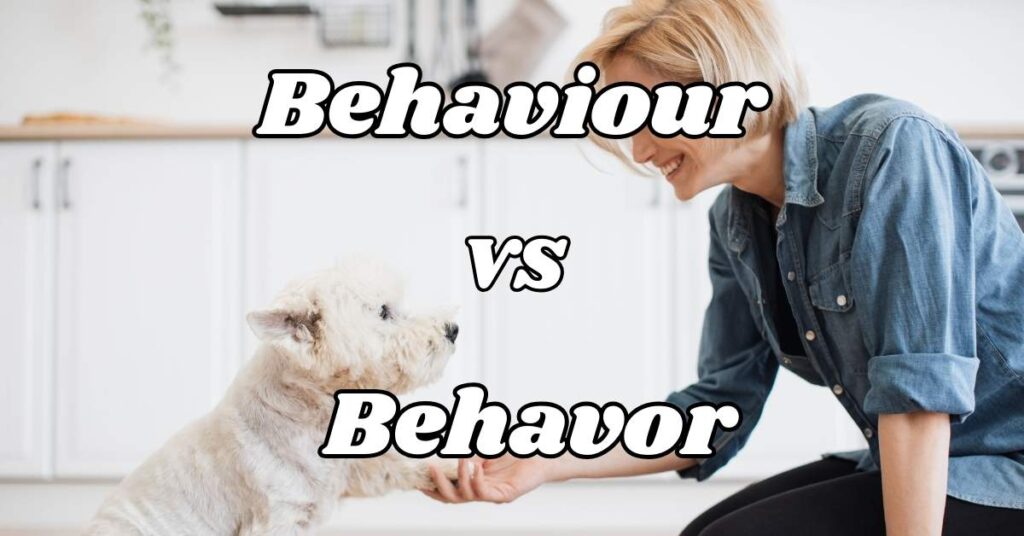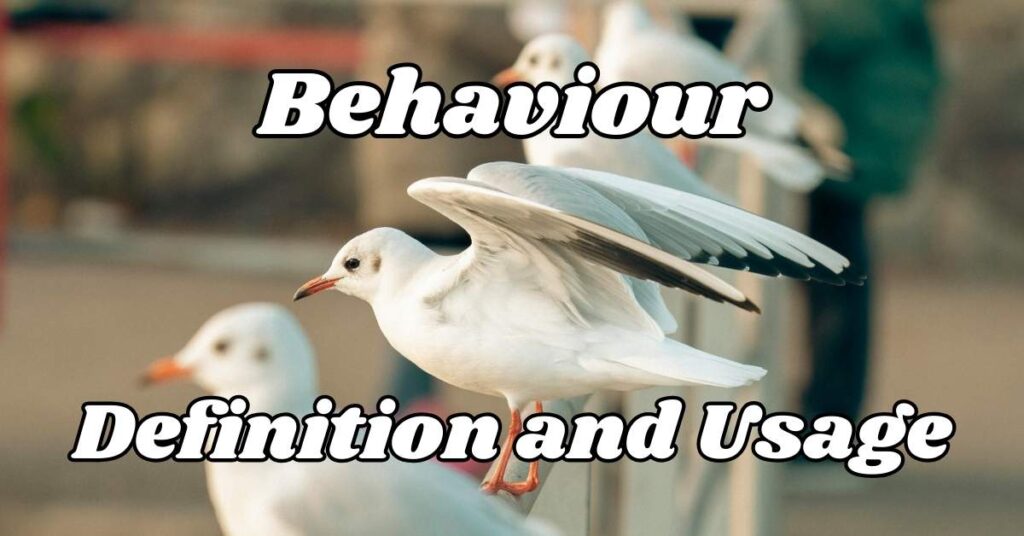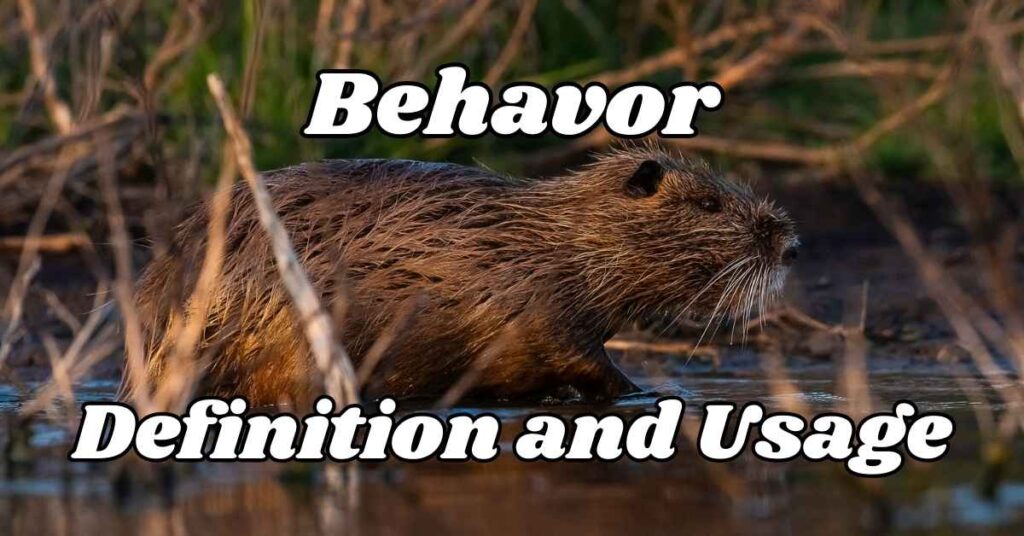Behaviour or Behavor is a topic that often confuses many English speakers, especially when considering the differences between American and British English. While behaviour is the standard spelling in British English, behavior is the preferred form in American English.
On the other hand, behavor is a common misspelling that lacks any recognized meaning. Understanding these distinctions is essential for effective communication, as they can influence how your message is perceived.
In this article, we will explore the definitions, usages, and origins of these terms, helping you navigate the complexities of English spelling and ensuring you use the correct form in your writing and conversations.
Quick Summary
At first glance, the words behaviour and behavor might confuse some people. Behaviour is the correct spelling in British English, while behavior is the standard form in American English.
On the other hand, behavor is often just a misspelling of behavior and does not hold any meaning in standard English. Understanding these differences can enhance your writing and speaking skills.
Difference Between Behaviour vs Behavor

The key difference lies in their spelling and usage. In American English, we use “behavior” without the letter “u.” In contrast, British English retains the “u,” resulting in “behaviour.” Many people mistakenly write “behavor,” thinking it is an alternative spelling.
However, this term does not exist in any recognized dictionary. Knowing these distinctions helps avoid confusion and ensures proper communication.
Origins of the Word Behaviour
The word “behaviour,” denoting conduct or manners, emerged in the late 15th century, drawing from “behave” and influenced by the Middle English term “havour,” meaning possession.
“Havour” itself evolved from the Old French verb “aveir,” meaning “to have.” Essentially, “behaviour” encapsulates the way one acts, whether positively or negatively, shaped by linguistic transformations over centuries.
Behaviour: Definition and Usage

Behaviour refers to the way a person, animal, or thing acts or functions. It encompasses observable actions, reactions, and mannerisms in various situations. In UK English, “behaviour” is the standard spelling.
Whether it’s social, sexual, or criminal, understanding behaviour helps analyze interactions and patterns. Good behaviour is often rewarded, while violent behaviour is a cause for concern.
Behaviour Definition
Behaviour refers to the way a person or animal acts or conducts themselves. It encompasses actions, reactions, and overall conduct in various situations. This term is widely used in fields such as psychology and sociology to analyze how individuals interact with their environment.
Behaviour Usage
In sentences, behaviour can describe both positive and negative actions. For example, you might say that a student’s good behaviour earns them praise from teachers. Alternatively, you could note that aggressive behaviour can lead to conflicts among peers.
Uses of Behaviour in a Sentence
- The child’s behaviour at school improved significantly after receiving guidance.
- Observing animal behaviour can reveal much about their instincts.
- Good behaviour is often rewarded in classrooms to encourage positive actions.
- Her behaviour during the meeting surprised everyone with its professionalism.
- Cultural norms greatly influence social behaviour across different societies.
Synonyms of Behaviour
- Conduct
- Actions
- Demeanor
- Attitude
- Mannerisms
- Habits
- Performance
- Reactions
- Practices
- Conductance
Behavor: Definition and Usage

“Behavor” is commonly a misspelling of “behavior,” which is the American English spelling. It is not recognized as a correct term in standard dictionaries. Recognizing this misspelling is important for clear communication.
While “behavior” describes actions and reactions, “behavor” should be avoided to maintain credibility and accuracy in writing.
Behavor Definition
The term behavor is often seen as a common misspelling of “behavior.” It does not carry any meaning or recognition in standard English dictionaries. Understanding that this term is incorrect can help avoid misunderstandings.
Uses of Behavor in a Sentence
While it’s crucial to recognize that behavor is incorrect, here are some examples illustrating its misuse:
- Many people mistakenly write “behavor” instead of “behavior.”
- The term “behavor” appears frequently in informal contexts but should be avoided.
- Spelling it as “behavor” can lead to confusion among readers.
- Teachers often correct students who write “behavor” on assignments.
- Understanding the correct spelling helps improve communication skills.
Side by Side Comparison
To clearly illustrate the differences between behavior and behaviour, here’s a comparison table:
| Aspect | Behavior (US) | Behaviour (UK) |
| Spelling | No ‘u’ | Includes ‘u’ |
| Usage Context | American English | British English |
| Examples | Commonly used | Less common in the US |
Everyday Usage Examples
Understanding context is key to using “behaviour” correctly. For instance, praising a student for excellent behaviour or studying consumer behaviour. These examples showcase how behaviour influences various interactions.
Recognizing these scenarios aids comprehension and proper word choice. Good or bad, behaviour is a part of everyday life.
Examples of Behaviour in Context

- The teacher praised her students for their excellent behaviour during the field trip.
- His aggressive behaviour during the game raised concerns among coaches.
- Understanding human behaviour is crucial for psychologists studying social interactions.
- The study focused on the behaviour of consumers when shopping online.
- Cultural differences can greatly affect social behaviour around the world.
Examples of Behavor
Using “behavor” is incorrect; it’s a misspelling of “behavior”. Instead, use the correct spelling based on the region: “behavior” in the US and “behaviour” in the UK. Correcting this mistake ensures clear communication and avoids confusion.
This highlights the importance of proofreading to maintain professionalism and credibility in your writing.
Common Mistakes
Many people often confuse these terms due to their similar sounds but different spellings. Common mistakes include using “behavor” instead of “behavior,” especially when writing informally or under time pressure.
Tips to Avoid the Mistakes
To help avoid these common errors:
- Always check your audience’s language preference before writing.
- Use spell-check tools that recognize regional differences between British and American English.
- Practice writing sentences using both forms correctly to reinforce learning.
- Familiarize yourself with common phrases that include these terms for better context.
- Read widely to see how different authors use these words correctly.
Tips to Remember the Differences
To keep track of which spelling to use:
- Remember that “behavior” is standard in American English while “behaviour” is used in British English.
- Associate “u” in “behaviour” with “United Kingdom” for easier recall.
- Create flashcards with definitions and examples for practice.
- Use mnemonic devices to help remember spelling differences effectively.
- Engage with language learning apps for reinforcement through interactive exercises.
More Article: 110+ Commonly Used Verbs That Start With E
FAQS: Behaviour or Behavor
Is it Behaviour or Behavor?
It is behaviour in British English and behavior in American English; behavor is an incorrect spelling.
Is Behavo grammatically correct?
No, behavo is not a recognized word in English; the correct terms are behaviour and behavior.
What is the meaning of Behaviour?
Behaviour refers to the way a person or animal acts, including their actions, reactions, and conduct in various situations.
What is the UK spelling of behaviour?
The UK spelling of the word is behaviour, which includes the letter “u” that is absent in the American spelling.
Conclusion
Understanding the difference between behaviour or behavor is crucial for effective communication in English. While behaviour is the correct spelling in British English and behavior is its American counterpart, behavor is simply a misspelling.
Recognizing this distinction helps avoid confusion and ensures clarity in your writing. Whether you’re discussing social behaviour, animal behaviour, or any other context, using the correct spelling demonstrates attention to detail and enhances your credibility.
By mastering these nuances, you can confidently navigate language differences and communicate effectively with diverse audiences.
Related Post: Plural of Quail: Is it Quail or Quails

